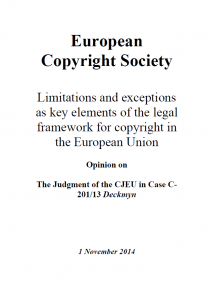European Copyright Society opinion on the Judgment of the CJEU in Case C-201/13 Deckmyn – Limitations and exceptions as key elements of the legal framework for copyright in the European Union
Abstract
In this opinion, the European Copyright Society (ECS) puts on record its views on the issues raised by the Judgment of the Court of Justice of the European Union (CJEU) in Case C-201/13, Deckmyn, which departs from the doctrine of strict interpretation of exceptions and limitations in cases in which fundamental rights such as freedom of expression are involved. The opinion welcomes this development for the following reasons: firstly, due to the importance of exceptions and limitations in facilitating creativity and securing a fair balance between the protection of and access to copyright works; secondly, because of the Court’s determination to secure a harmonized interpretation of the meaning of exceptions and limitations; thirdly, because of the Court’s adoption of an approach to the interpretation of exceptions and limitations which promotes their effectiveness and purpose; and, finally, due to the Court’s recognition of the role of fundamental rights in the copyright system: in particular, its recognition that the parodic use of works is justified by the right to freedom of expression. At the same time, the ECS recommends caution in constraining the scope of exceptions and limitations in a manner that may go beyond what might be considered necessary in a democratic society.
On behalf of the European Copyright Society:
- Prof. Lionel Bently Director,
Centre of Intellectual Property and Information Law (CIPIL), University of Cambridge, United Kingdom - Prof. Estelle Derclaye,
Professor of Intellectual Property law, University of Nottingham, School of Law, United Kingdom - Prof. Graeme B. Dinwoodie,
Professor of Intellectual Property and Information Technology Law, University of Oxford, United Kingdom - Prof. Séverine Dusollier,
Professor at SciencesPo Paris (France) and at the University of Namur (Belgium) - Prof. Christophe Geiger,
Associate Professor, Director General and Director of the research department of the Centre for International Intellectual Property (CEIPI), University of Strasbourg, France - Jonathan Griffiths,
Reader in Intellectual Property Law, Queen Mary, University of London, United Kingdom - Prof. Reto M. Hilty,
Director, Max Planck Institute for Innovation and Competition, Munich, Germany - Prof. P. Bernt Hugenholtz,
Director, Institute for Information Law, University of Amsterdam, The Netherlands - Prof. Marie-Christine Janssens,
Professor of Intellectual Property Law; Head of Centre for Intellectual Property Rights and ICT, University Leuven, Belgium - Prof. Martin Kretschmer,
Director, CREATe, University of Glasgow, United Kingdom - Prof. Axel Metzger,
Professor of Civil and Intellectual Property Law, Humboldt-Universität, Berlin, Germany - Prof. Alexander Peukert,
Goethe University, Frankfurt am Main, Germany - Prof. Marco Ricolfi,
Chair of Intellectual Property, Turin Law School, Italy - Prof. Ole-Andreas Rognstad,
Professor of Law, Department of Private Law, University of Oslo, Norway - Prof. Martin Senftleben,
Professor of Intellectual Property and Director, Kooijmans Institute for Law and Governance, VU University Amsterdam, The Netherlands - Prof. Alain Strowel,
Professor, Catholic University of Louvain and University of Saint-Louis Brussels, Belgium - Prof. Michel Vivant,
Professor at SciencesPo (Paris) and at the CEIPI (University of Strasbourg), France - Prof. Raquel Xalabarder,
Chair on Intellectual Property, Universitat Oberta de Catalunya, Barcelona, Spain
Download as PDF document.

